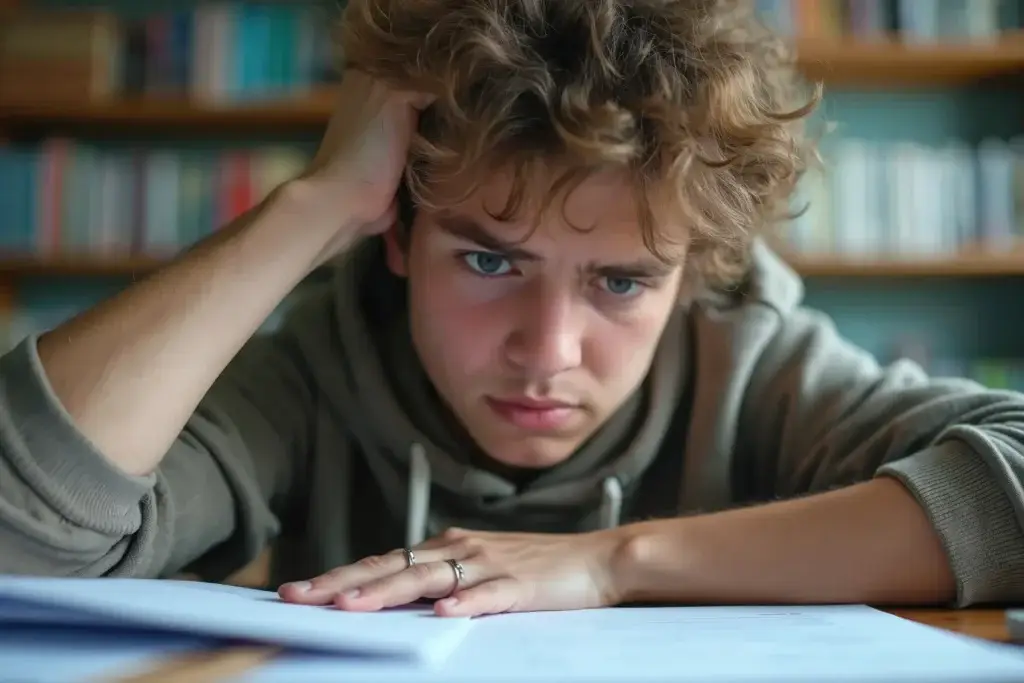Why Strong Problem Solving Skills Matter More Than Ever
It’s a familiar scene for many parents: your child gets stuck on a math word problem or a science project, and instead of brainstorming or trying again, they immediately shut down. No matter how many times you encourage them to “just think it through,” they freeze, stall, or give up. This isn’t just about a tough assignment—it’s about problem solving skills.
Strong problem solving techniques help students approach challenges with flexibility, persistence, and a plan. Whether it’s navigating a confusing worksheet or managing a group project, students need to know how to break things down, adapt when things go wrong, and recover when they feel stuck.
In today’s fast-paced, often unpredictable academic environments, creative problem solving skills aren’t just helpful—they’re essential. And for kids with executive function challenges, these skills can be especially difficult to access without support.
Before diving deeper into how to boost your child’s problem solving skills, take a moment to watch this short video. I’ll explain exactly what we’ll cover below, illustrate how underdeveloped executive functions impact daily life, and briefly highlight the unique methods I utilize with clients.
How Executive Function Impacts Problem Solving Techniques
Many parents are surprised to learn that what looks like a motivation issue is actually a breakdown in executive function. Skills like planning, impulse control, working memory, and mental flexibility are the foundation of effective problem solving techniques—and when those executive functions are lagging, even small problems can feel insurmountable.
Let’s say your child is writing a history paper and gets stuck on the introduction. Without the cognitive flexibility to try a new angle—or the working memory to juggle ideas—they may just shut the laptop and say, “I don’t know what to write.” That’s not laziness. It’s a gap in executive function that makes problem solving skills feel inaccessible.
This connection is well-documented. Executive function allows students to pause, analyze a situation, think through possible approaches, and adjust when something doesn’t work. Without it, they’re likely to get stuck in loops of avoidance, frustration, or perfectionism.
Strengthening executive function is key to helping students apply creative problem solving techniques effectively and consistently.
Signs Your Child May Be Struggling With Creative Problem Solving and Executive Function
Recognizing when your child is facing challenges with creative problem solving and executive function can be the first step toward providing effective support. Here are some common signs to watch for:
- Avoidance of tasks that require planning or multi-step processes
- Difficulty adapting to new or unexpected situations
- Struggles with organizing thoughts or materials
- Becoming easily frustrated when faced with complex problems
- Reliance on adults to guide them through problem-solving tasks
These behaviors may indicate difficulties in executive functions such as working memory, cognitive flexibility, and inhibitory control, which are crucial for effective problem solving skills. Research has shown that deficits in these areas can significantly impact a child’s ability to engage in creative problem solving and adapt to new challenges (Diamond & Lee, 2011).
Why Telling Kids to “Just Try Harder” Doesn’t Help
When students get stuck, many well-meaning parents respond with encouragement: “Just try harder.” But for kids with executive function challenges, this advice often backfires. It assumes they already have problem solving techniques—but in reality, they may not know where to start or what else to try.
This is why building problem solving skills isn’t about pushing harder—it’s about teaching differently. Students need structure, strategies, and time to reflect on how they think. That’s where metacognition comes in: helping them become aware of their thinking so they can learn how to change it.
Without this support, students often internalize their struggles as personal failures. Research by Meltzer and Krishnan (2007) found that students with executive function deficits who lacked creative problem solving support experienced higher levels of academic stress and disengagement. Simply encouraging more effort doesn’t address the real barrier—they need tools to manage their thoughts, emotions, and behaviors in the face of challenge.
If we want to improve problem solving skills, we have to meet students where they are—and guide them from confusion to clarity.
Executive Function Strategies to Build Creative Problem Solving at Home
You don’t need to be a teacher or therapist to help your child develop stronger creative problem solving habits. In fact, some of the most effective interventions happen at home—when kids are coached, not rescued, through stuck points.
Here are a few executive function strategies that can strengthen problem solving skills while promoting independence:
- Visualize the first step: Before diving into a task, ask your child, “What’s the very first thing you need to do?” This bypasses overwhelm and builds momentum.
- Practice flexible thinking: Use questions like, “What’s another way to try this?” to model adaptive responses.
- Use the Plan – Do – Reflect model: Break tasks into three phases. This builds both self-awareness and follow-through.
- Normalize mistakes: Talk through errors and model how to recover. This reinforces problem solving techniques in real-life settings.
- Create checklists for multi-step tasks: Externalizing working memory helps kids stay on track without constant reminders.
- Celebrate small wins: Confidence grows when kids see their own progress—not just the end result.
Research by Best, Miller, and Naglieri (2011) shows that executive function skills are strong predictors of problem-solving success across academic subjects. When parents and caregivers actively support strategy development, kids are better equipped to engage in creative problem solving both in and outside the classroom.
How to Support Without Over-Rescuing
As a parent, it’s natural to want to jump in when your child is struggling. But the goal isn’t to solve the problem for them—it’s to help them build the tools to solve it themselves. This is especially important when they’re working on problem solving skills tied to executive function.
Here’s the balance: offer guidance without taking over. Scaffold without smothering. Encourage your child to try different problem solving techniques while also modeling how you approach challenges. Say things like, “Let’s think through this together,” or “What’s something we haven’t tried yet?”
It may take time. It may get messy. But that’s exactly how kids build creative problem solving skills—by making mistakes, learning what doesn’t work, and reflecting on what does.
Blair and Raver (2015) found that supportive adult interactions are essential in helping children apply executive function strategies during problem solving tasks. When parents focus on structure, reflection, and persistence instead of results alone, children develop the resilience and flexibility they need to work through challenges on their own.
A Real-Life Story of Coaching Problem Solving Skills Through Executive Function Work
When I first met Ethan, a 10th grader, he was shutting down on every group project, every math test, and every writing prompt. His parents described him as bright but “frozen” when problems didn’t have clear steps. They had tried giving advice, pep talks, even rewards—but nothing seemed to stick. His problem solving skills were stuck behind a wall of frustration and perfectionism.
What Ethan really needed wasn’t more pressure—it was a new way to think about problems.
During our coaching sessions at Executive Functions Coach, we worked on practical problem solving techniques like breaking down multi-step tasks, brainstorming multiple approaches, and pausing to evaluate what was and wasn’t working. We also practiced emotional regulation strategies, so that getting stuck didn’t mean shutting down.
One session, we built out a “Plan B Bank”—a list of fallback ideas Ethan could draw on when his first plan failed. That single tool boosted his confidence in tackling unfamiliar problems. Within a few months, he wasn’t just completing assignments—he was thinking critically, collaborating more with classmates, and using creative problem solving in real time.
Stories like Ethan’s are a reminder: when kids are given structure and support—not shortcuts—they grow in ways that stick.
Worried About Your Child’s Problem Solving Skills? Let’s Talk
If your child avoids challenges, freezes during multi-step tasks, or relies too heavily on you to get through schoolwork, you’re not alone—and neither are they. These behaviors aren’t signs of laziness. They’re often signs of underdeveloped problem solving skills rooted in executive function challenges.
The good news? These skills can be taught.
At Executive Functions Coach, we work with families to strengthen the routines, strategies, and mindset needed for success. Whether your child struggles with planning, flexible thinking, or staying regulated in tough moments, we help them build the tools they need to develop lasting problem solving techniques and real-world confidence.
If you’re curious whether this kind of support could help, join one of our free consultation sessions. We’ll walk you through what we do, how we tailor support to each student, and how to know if executive function coaching is right for your childWith structure, reflection, and guidance, students don’t just learn—they learn how to solve problems creatively, confidently, and independently.
References
Best, J. R., Miller, P. H., & Naglieri, J. A. (2011). Relations between executive function and academic achievement from ages 5 to 17 in a large, representative national sample. Learning and Individual Differences, 21(4), 327–336. https://doi.org/10.1016/j.lindif.2011.01.007
Blair, C., & Raver, C. C. (2015). School readiness and self-regulation: A developmental psychobiological approach. Annual Review of Psychology, 66, 711–731. https://doi.org/10.1146/annurev-psych-010814-015221
Diamond, A., & Lee, K. (2011). Interventions shown to aid executive function development in children 4 to 12 years old. Science, 333(6045), 959–964. https://doi.org/10.1126/science.1204529
Meltzer, L., & Krishnan, K. (2007). Executive function difficulties and learning disabilities: Understanding and managing comorbidities. Journal of Learning Disabilities, 40(6), 466–478. https://doi.org/10.1177/00222194070400060201


